Text: Romans 12:17-21(see below)
There is a poignant moment in the Broadway musical “1776” when John Adams sitting alone at night in the chamber of the Continental Congress sings: “Is anybody there? Does anybody care?”
On Thursday, the war in Iraq came to an end after nine lengthy years.
“Is anybody there? Does anybody care?”
I was struck by the little fanfare there was to mark such a significant event in the course of history. No church bells pealed in the morning air. Schools were not called off so that children and their parents might be together to welcome home troops or reflect on the end of the war. Businesses continued their holiday sales as if nothing had happened. Not one church in the town I live in offered a worship service to give thanks to God for the end of war; to honor the dead; and to pray for healing for those who have suffered casualties.
“Is anybody there? Does anybody care?”
The numbers regarding this war are staggering:
· 3,187 Days the U.S has been in Iraq
· 1,000,000,000,000 (one trillion) Cost in dollars of Iraq war
· 1,500,000 Number of U.S. citizens who have served in
Iraq since beginning of the war
· 170,000 Number of U.S. troops in Iraq at peak in 2007
· 4,485 Number of U.S. military members killed in Iraq
· 32,226 Number of U.S. service members wounded in
hostile action
· 113,728 Number of Iraqi civilians killed in war
· 1 Number of U.S Iraq or Afghanistan veterans who try to
kill themselves every 80 minutes
Thomas Merton, a Trappist monk, wrote: "War represents a vice that mankind would like to get rid of but which it cannot do without. Man is like an alcoholic who knows that drink will destroy him but who always has a reason for drinking. So with war." Martin Luther, the great theologian of the Reformation penned: "War is the greatest plague that can afflict humanity; it destroys religion, it destroys states, it destroys families. Any scourge is preferable to it.”
“Is anybody there? Does anybody care?”
Why did we go to war in the first place? Does anyone remember? Was it for a good cause or selfish ambition? In the end, did the United States liberate a people or like the arrogant alcoholic, mentioned above, create more of a mess? What have we learned from these nine years of battle and how will it affect our future together as a nation and as a world?
I am glad that the brave men and women of our armed forces are coming home. I give thanks for their willingness to serve, for their bravery, and for their courage. I mourn for those 4,485 souls who made the ultimate sacrifice and who now reside on another shore. I weep with their families and pray for healing in their lives as they try to move forward. To the 32,000 men and women of our armed forces who have come home wounded, I pray for your healing and hope that the Lord will guide me in ways that can reach out to you and offer the solace of the Gospel in word and deed.
“Is anybody there? Does anybody care?”
But where are the churches as the end of war has come? Where are the Christian leaders calling the faithful to worship, prayer, and reflection about the nature, horror, and effects of war? As a priest in the Church, I question myself as to why I was so silent over the course of nine years? How will the Church influence society so that our nation will end the current war in Afghanistan and persuade to limit its participation in future wars only as a last result?
Origen, an early Christian scholar of the third century wrote:"Christians no longer take up the sword against nation, not do we learn war any more, having become children of peace, for the sake of Jesus, who is our leader." Tertullian, another early Church Father said, “When Christ disarmed Peter in the garden, he disarmed all Christians.”
“Is anybody there? Does anybody care?”
Love One Another - Brian
Five days remaining to Saint Thomas’ Day and an end to our preparations for Christmas. How are your plans coming along?
Facing the Paradox Squarely
Norman Angell
“Let us face squarely the paradox that the world which goes to war is a world, usually, genuinely desiring peace. War is the outcome, not mainly of evil intentions, but on the whole, of good intentions which miscarry or are frustrated. It is made, not usually by evil men knowing themselves to be wrong, but by the outcome of policies pursued by good men usually passionately convinced that they are right.”
Source: The Words of Peace
Romans 12:17-21
"Do not return evil for evil. Avenge not yourselves, but rather give way to wrath; for it is written, vengeance is mine; I will repay, says the Lord. Therefore if your enemy is hungry, feed him; if he is thirsty, give him drink: for in so doing you shall heap coals of fire on his head. Be not overcome by evil, but overcome evil with good."
